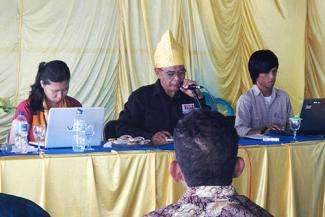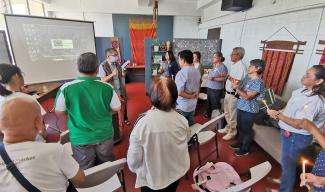The issuance of Law No 6 of 2014 on Villages (Village Law, referred to as UU Desa in Indonesian) serves as momentum to accelerate the recognition of indigenous rights in this nation. Indigenous people in customary areas of To Ulawi and Togian islands, Sigi District, Central Sulawesi. 4 sub-districts in Sigi district still use custom and culture in their communities.
For a long time Sigi and also customary areas such as To Kulawi are autonomous areas and they are not easily influenced by outside culture. For example, the values of Hintuwu,Katuwua and Pekahowia, still continue in its entirety in Sigi, and more specficially in To Kulawi, Rizal Mahfud of AMAN's Central Sulawesi chapter explained during the Opportunities and Optimisation of Law No 6 of 2014 on Villages and Ministry of Home Affair Regulation No 52 of 2014 on Recognition and Protection of Indigenous Peoples in To Kulawi Mountain Areas and Togian Islands Maritime Area†meeting. This activity was held on the 5th of November 2014 in Kulawi and 26th November 2014 on Togian Islands.
The Village Law can be well-implemented if indigenous peoples understand their soveireignity in defending their existence. Several articles in the law regulate Desa Adat (customary village) as a legal norm adopted from the Constitutional Court ruling MK No 35/PUU/X/2012, together with several other of their relevant decisions regarding the recognition of indigenous peoples. This law can be used in efforts to expand local action to provide an understanding to government that accelerating the Bill on Recognition and Protection of Indigenous Peoples (abbreviation: RUUPPHMA) is a must and cannot be delayed any further.
Law No 6 of 2014 on Vilages can be used to drive local laws (Perda) on indigenous peoples in Sigi district. Minister of Home Affairs Regulation (Permedagri) No 52.2014 No 52 is an entry point to push the Sigi regent to establish an identification,verification and validation team for the indigenous people of To Kulawi and their traditional rights and we hope the regent will then issue a Regent's Decree on Recognition and Protection of the To Kulawi indegenous people, Rizal added.
Regional government needs to be pushed to immediately release a Regent Regulation (perbub) on the execution of the 2015 local budget. In the implementation of Law No 6 of 2014, indigeous peoples need to be prepared. This law shouldn't just be understood as providing a large opportunity for villages to receive government funding, but failing to implement the substance of the law. In implementing this law, mapping of customary areas and forests which are governed according to local wisdom needs to be done..
The Constitutional Court decision number 35 is not a technical decision. The logic is that when an article in the law is changed, thus that law should also be amended. Erasmus Cahyadi from Aman stated that currently, we can whether regional regulations can be used as instrument to bridge that decision. The Ministry of Forestry stated that not a single regional regulation bridges the aforementioned Constitutional Court ruling.
What we have to do is develop a regional regulation that recognises indigenous peoples, he explained.
Eras also asserted that the customary institution, which developed in Ngata, is not an institution established by the district. In fact, it is a customary instition in the village. It needs to be understood that a customary vilage is comprised of indigeous people, but not all indigeous peoples' customary villages can be categorised in the same way.
“Based on those two regulations, we would like to convey that the Sigi government has developed two regulation drafts on the empowerment and protection of customary law communities which are still being discussed at the executive level and then it will be put forward to the Sigi district council during their 3 plennary session in 2014. The substance regulated in the regulated includes empowerment of customary institutions and customary law communities and protection of customary law communities, stated Andi Muhyur, a member of the Sigi regent's staff who was present at the meeting.
The meeting, initiated by the Central Sulawesi chapter of AMAN, was attended by the community of To Kulawi and Togian islands. There were representatives from local government,customary assembly and institutions, village government and other leaders. 47 of the participants were indigenous women.
In history, the women of Kulawi were involved in institional level decision making. But with the passage of time, this role was purposely erased, as asserted by Ibu Rukmini and Ibu Binta Yarama, two of the women present at the meeting.




